
 To Michael Campbell Copyright 2019 by Robert W. Bly All rights reserved. No part of this book may be reproduced in any manner without the express written consent of the publisher, except in the case of brief excerpts in critical reviews or articles. All inquiries should be addressed to Skyhorse Publishing, 307 West 36th Street, 11th Floor, New York, NY 10018. Skyhorse Publishing books may be purchased in bulk at special discounts for sales promotion, corporate gifts, fund-raising, or educational purposes. Special editions can also be created to specifications.
To Michael Campbell Copyright 2019 by Robert W. Bly All rights reserved. No part of this book may be reproduced in any manner without the express written consent of the publisher, except in the case of brief excerpts in critical reviews or articles. All inquiries should be addressed to Skyhorse Publishing, 307 West 36th Street, 11th Floor, New York, NY 10018. Skyhorse Publishing books may be purchased in bulk at special discounts for sales promotion, corporate gifts, fund-raising, or educational purposes. Special editions can also be created to specifications.
For details, contact the Special Sales Department, Skyhorse Publishing, 307 West 36th Street, 11th Floor, New York, NY 10018 or . Skyhorse and Skyhorse Publishing are registered trademarks of Skyhorse Publishing, Inc., a Delaware corporation. Visit our website at www.skyhorsepublishing.com. 10 9 8 7 6 5 4 3 2 1 Library of Congress Cataloging-in-Publication Data is available on file. Cover design by Qualcom Designs ISBN: 978-1-5107-4175-1 Ebook ISBN: 978-1-5107-4176-8 Printed in the United States of America Acknowledgments I want to thank my literary agent, Bob Diforio, for his usual fine work in finding a home for this book. Thanks also to my editor, Michael Campbell, for his extraordinary gift of time and patience enabling me to write what turned out to be a much more difficult book than I originally anticipatedthanks to his sharp editing, a much better book, too.
In addition, I owe a debt of gratitude to the dozens of copywriters, salespeople, entrepreneurs, speakers, writers, advertising agencies, and marketers whose most potent persuasive phrases made their way into this book. I cant name them all, but you know who you are, folks. A good advertisement is one which sells the product without drawing attention to itself. It should rivet the readers attention on the product. It is the professional duty of the advertising agent to conceal his artifice. David Ogilvy, Confessions of an Advertising Man Table of Contents Introduction T he rise of the web has created an increased demand for people who can persuade others with words.
Selling on the Internet is steadily approaching a trillion-dollar market; in 2017, global e-commerce revenues were $360 billion. And that doesnt include all the other selling that takes place every day, both online and offlinefrom infomercials offering ab machines to car salespeople trying to sell more autos, and even Jehovahs Witnesses persuading people to join their religion by going door to door. The New York Times reports that the average city dweller sees up to 5,000 ad messages per day, as amazing as that sounds. In 2017, U.S. businesses spent $197 billion on advertising. What are the secrets to persuading others in print, on the screen, or in person using words? One of the most potent is the use of the trigger words and phrases that motivate people, command attention, and persuade them to buy your product or service.
As an old radio commercial for a mail-order vocabulary course once noted: People judge you by the words you use. Eventually, everybody has access to the same technology. So once everyones technologically up-to-date, the one thing remaining that separates your marketing campaign from your competitors is the words you use. The Big Book of Words That Sell is your guide to many of the worlds most persuasive words and phraseswords that can affect how readers or listeners think, feel, and actand influence what they believe and do. After reading this book, you will be able to: Sell virtually any product or service. Convince people to agree with your point of view.
Select just the right words for every marketing campaign. Transform tepid writing into sparkling and persuasive prose. Improve click-throughs, conversions rates, and other performance metrics. Find ready-to-use phrases and sentences that fit your ad perfectly. Use language that has been proven to sell. Choose the right keywords and keyword phrases.
The format is simple. The book has hundreds of entries organized by category as shown in the table of contents. The words and phrases are grouped in chapters according to application, e.g., words that create a sense of urgency, words that announce a new product, or ones that grab the readers attention. Each entry is a persuasive word or phrase in boldface, followed by an example, in italics, of its use. Many of the examples are from actual ads, websites, and other copy and content, both digital and offline. Each section has a short introduction explaining the theme or concept the words in the section are used to communicate, or the communications goal their use aims to achieve.
The book serves several audiences, and because you are reading it, I am guessing you fall into one or more of the following categories: Selling products and services on the Internet has become the biggest entrepreneurial business opportunity of the 21st century. Therefore, the book has wide appeal to online entrepreneurs, of which The book is also ideal for aspiring Internet marketing entrepreneurs as well as those who already have an online business but want to increase their sales. SmallBusinessBible.org reports that the Internet today is a huge marketplace with over a billion visitors going online every day, and that according to research surveys conducted, there are millions of businesses and stores online with literally hundreds of thousands of web pagesa large number of which require persuasive writing. The book is also a valuable resource for those who sell for a living: sales managers, professional sales representatives, ad agencies, PR firms, copywriters, content writers, public relations professionals, marketing managers, brand managers, product managers, account executives, telemarketers, and multilevel marketers. Advertising and marketing professionals as well as salespeople are held accountable for results today, and these tested words and phrases can help make your numbers better and produce more sales and profits. In addition, virtually every small business sells a product or service.
The book will give these business owners and managers the vocabulary they need for more effective marketing, selling, and communication. Even if you are not by profession in sales or marketing, you may find The Big Book of Words That Sell interestingeven helpful. There are endless situations that require persuasion but have nothing to do with marketing, advertising, or selling a product or serviceeverything from getting more members to attend your monthly club meetings to asking your landlord not to raise the rent. A Few More Words about the Words in This Book You may notice that almost all of the words and phrases in this book are short, simple, and easy to understand. Plain English. Not highfalutin language.
Thats deliberate. And heres why. Copywriters and other writers long ago discovered that most adults read at the level of elementary school students. Today, English skills, literacy, and the reading skills of your prospects are, if anything, declining rather than improving. There are many reasons. I wont go into most of them here.
But obviously, the web has trained people to read increasingly shorter and simpler text. Getting through and comprehending a 200-page book requires greater thought and attention span than reading a 200-word blog post. We know from long experience that for our copy to work, it has to be understood. In fact, Ralph Waldo Emerson said it is not enough to write to be understood; you have to write so clearly and simply that your readers cannot possibly misunderstand you. And that is not always easy to achieve. As Terry C.
Next page
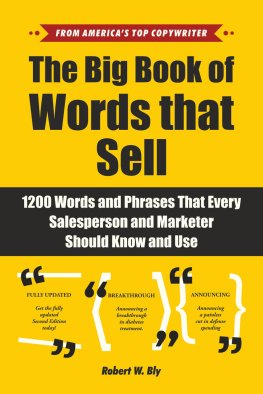

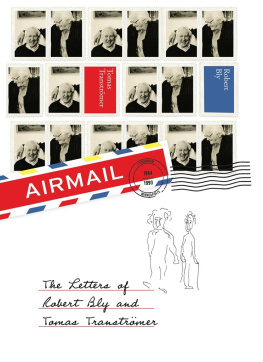
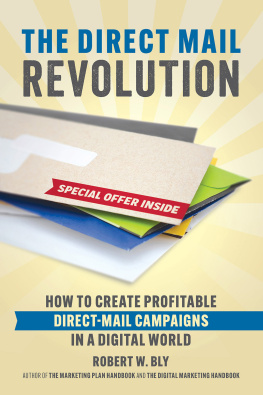


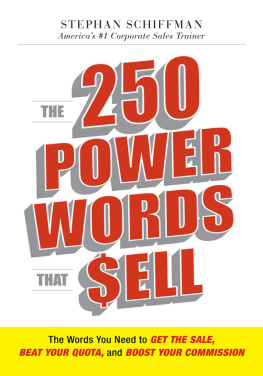


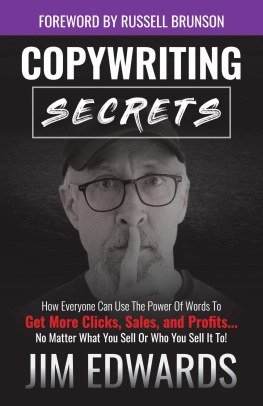
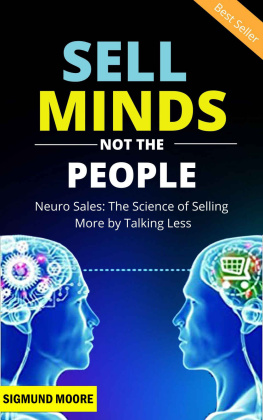
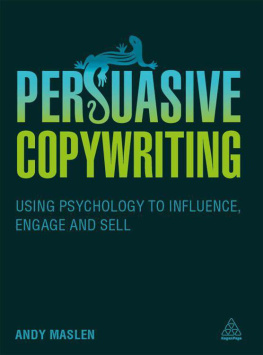
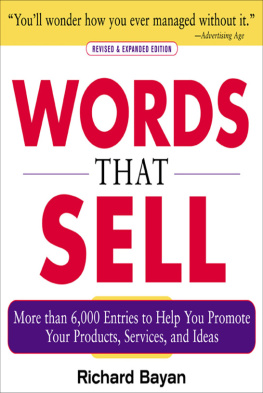
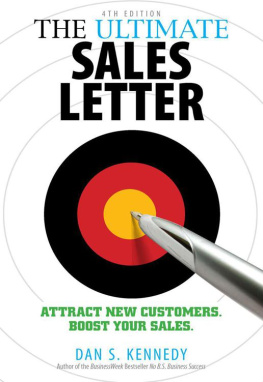
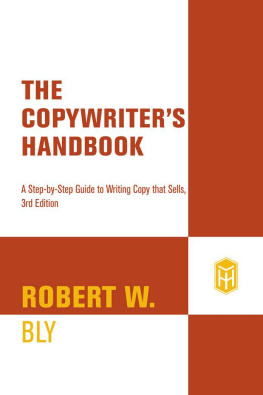
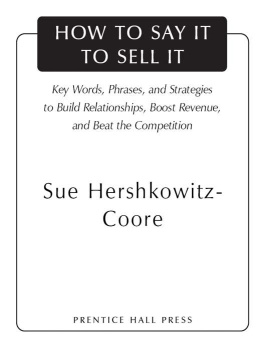

 To Michael Campbell Copyright 2019 by Robert W. Bly All rights reserved. No part of this book may be reproduced in any manner without the express written consent of the publisher, except in the case of brief excerpts in critical reviews or articles. All inquiries should be addressed to Skyhorse Publishing, 307 West 36th Street, 11th Floor, New York, NY 10018. Skyhorse Publishing books may be purchased in bulk at special discounts for sales promotion, corporate gifts, fund-raising, or educational purposes. Special editions can also be created to specifications.
To Michael Campbell Copyright 2019 by Robert W. Bly All rights reserved. No part of this book may be reproduced in any manner without the express written consent of the publisher, except in the case of brief excerpts in critical reviews or articles. All inquiries should be addressed to Skyhorse Publishing, 307 West 36th Street, 11th Floor, New York, NY 10018. Skyhorse Publishing books may be purchased in bulk at special discounts for sales promotion, corporate gifts, fund-raising, or educational purposes. Special editions can also be created to specifications.